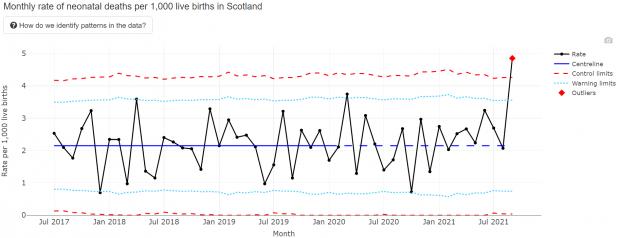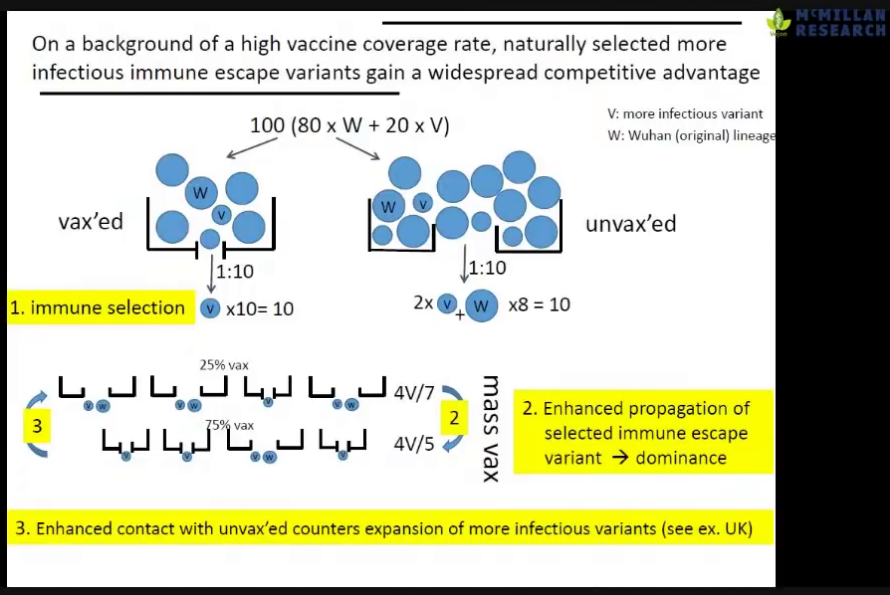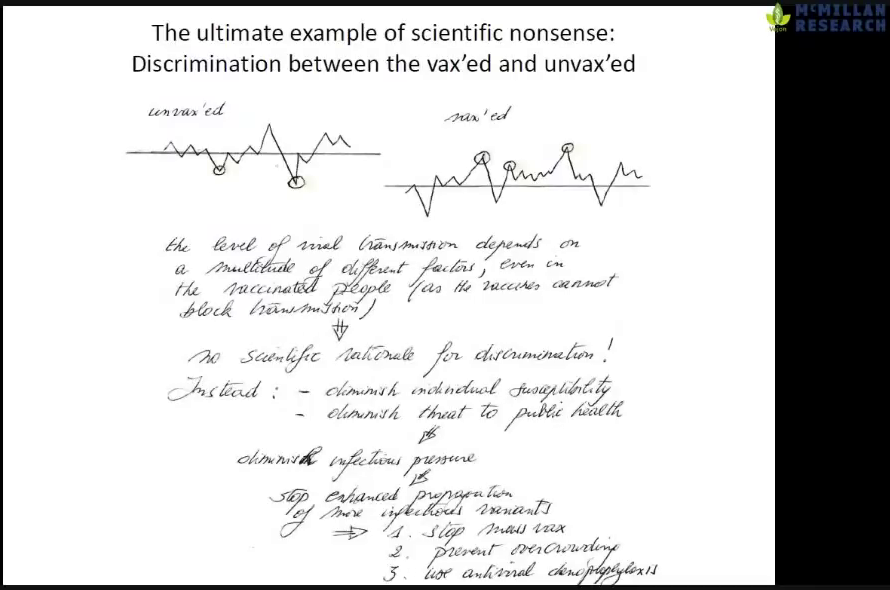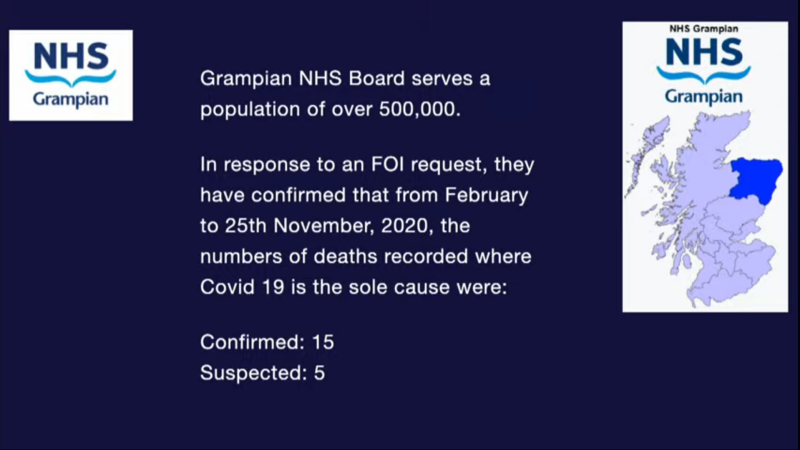Healthcare Improvement Scotland (HIS) confirmed that it has appointed retired consultant neonatologist Dr Helen Mactier to chair the expert group which will investigate the possible causes behind two unexplained spikes in neonatal mortality just six months apart, in September 2021 and March 2022, when a total of 39 infants died.
Scotland
Browse the articles related to this topic below.
Join our community on Guilded.
PUBLIC health experts ruled out any link between spikes in neonatal deaths and the Covid vaccine without checking whether any of the infants’ mothers had received the jag during pregnancy.
The Scottish government has ordered the review of neonatal death rates after two spikes over a six-month period. Both increases were larger than what would normally be expected.
At least 18 babies under four weeks old died in March. That came after at least 21 babies died in September last year.
The review will be carried out by Healthcare Improvement Scotland.
It is expected to last six to nine months and cover all reported baby deaths between April 2021 and March 2022.
http://archive.today/2022.10.01-094118/https://www.bbc.com/news/uk-scotland-63097142
A detailed analysis of where almost £5bn of Covid business funding went is not possible due to gaps in data, a spending watchdog has found.
The Scottish government provided £4.4bn in grants and business rates relief between the start of the pandemic and October last year.
A further £375m was announced following the emergence of Omicron last winter.
The government said the speed and scale of the roll out helped to safeguard thousands of job and businesses.
But Audit Scotland was unable to determine where all the money ended up.
…Scottish Conservative finance spokeswoman Liz Smith acknowledged the speed with which the money had to be released but said the report highlighted a “shocking lack of data” meant “enormous sums of public money were paid out” but “we don’t properly know where it went”.
https://web.archive.org/web/20220317095443/https://www.bbc.com/news/uk-scotland-60770729
More than 240,000 calls to NHS 24 went unanswered from September to January in figures described as “astonishing” by opposition parties.
At a time when patients were urged to call the helpline before turning up to A&E, an average of almost 50,000 calls per month to the NHS 111 number failed to be connected.
The highest number of abandoned calls occurred in September 2021 when 68,119 were left unanswered, according to data obtained by the Scottish Conservatives.
Over the festive period, in December, on more than 46,000 occasions callers were unable to speak to anyone.
The Conservatives said that “shockingly” on January 3, very nearly half of all calls (49.7%) were abandoned, accounting for more than 7,000 abandoned calls on that day alone.
DOUBLE-JABBED Scots are now more likely to be admitted to hospital with Covid than the unvaccinated amid an increase in elderly people falling ill due to waning immunity.
It comes amid “weird” data showing that case rates have been lower in unvaccinated individuals than the single, double, or even triple-jabbed since Omicron became the dominant variant in Scotland.
The counterintuitive data from Public Health Scotland (PHS) contradicts previous pandemic trends which have consistently shown infection, hospitalisation and death rates to be highest among the unvaccinated.
Scotland international Siobhan Cattigan has died aged 26, Scottish Rugby has announced.
Several care home residents in Scotland expecting to receive their dose of the coronavirus vaccine were instead injected with salt water.
Some 11 residents at Millbrae Care Home, in Coatbridge, North Lanarkshire, were mistakenly given a saline solution used to dilute the Pfizer vaccine once removed from freezers, according to the The Sunday Mail.
Trudi Marshall, Health and Social Care North Lanarkshire nurse director, told Metro.co.uk: ‘None of the residents who received the vaccine diluent came to any harm and they were re-vaccinated on the same day.
An investigation has been launched into a spike in deaths among newborn babies in Scotland.
Official figures reveal that 21 infants died during September within 28 days of birth, causing the neonatal mortality rate to breach an upper warning threshold known as the ‘control limit’ for the first time in at least four years.
Control and warning limits are designed to flag up to public health teams when neonatal, stillbirth or other infant deaths are occurring at unexpectedly high or low levels which may not be due to chance.
Concerns have previously been raised about the potential impact of Covid on maternity services and maternal wellbeing, but it is the first time since the pandemic began that neonatal deaths have been so abnormally above average.
Although the rate fluctuates month to month, the figure for September – at 4.9 per 1000 live births – is on a par with levels that were last typically seen in the late 1980s.

Health experts have been left baffled by a big rise in a common and potentially fatal type of heart attack in the west of Scotland.
During the summer there was a 25 per cent rise in the number of people rushed to the Golden Jubilee National Hospital in Clydebank with partially blocked arteries cutting blood supply to the heart.
Dr. Philip McMillan interviews vaccine developer Geert Vanden Bossche and Robert Malone MD, inventor of mRNA vaccine platform.
Interview highlights
- Geert Vanden Bossche (GV) at 17m: Massive surges of the infection rates, especially in countries with an aggressive mass-vaccination policy, was predictable.
- Robert Malone (RM) at 23m: The Israeli data is a concern: we are seeing signs that the durability of the [Pfizer vaccine] is very poor.
- RM at 26m: The vaccinated are a higher risk of becoming superspreaders because they’re replicating virus at the same or higher levels than the unvaccinated but they feel better.
- GV at 28m: The effect of mass-vaccination is an ideal breeding-ground for more infections spread. However, if still have a substantial proportion that is non-vaccinated, you will see a reduction of infectious pressure.
- GV at 31m: The unvaccinated are ‘the vaccum cleaners’ who will eliminate a lot of virus from the population by mounting long-lived immunity and contribute to the reduction of infectious pressure. The vaccinated cannot contribute to the infectious pressure.
- RM at 33m: The truth is that it’s the vaccinated that are creating the risk, not the unvaccinated. The unvaccinated are serving as virus sinks. The probability of them having significant disease and death is minute. The real risk is the vaccinated who have received very focused spike proteins.
- GV at 35m: It is not a problem of individuals being vaccinated. The problem is a policy of mass-vaccination. That is how the more infections variant can adapt to the population and become dominant.
- GV at 58m: Young people are now getting the disease pretty fast because of the increased infectious pressure [due to mass-vaccination].
- RM at 1h10m: There are disincentives to asking questions about data for vaccine-enhanced replication and antibody-dependent enhancement; no-one wants fund the studies.
- GV at 1h12m: Regulators have no experience with the current situation where there are very many unknowns when deploying a new vaccine to the public.
- RM at 1h17m: The FDA is not structured to detect adverse advents and have admitted they cannot evaluate safety. Two of the top [US] regulators resigned because the FDA is no longer independent from the policy-making apparatus which exists in the Executive Branch [of US Government].
- RM at 1h24m: There is an intrinsic conflict of interest in the CDC in that it is funded to promote vaccines but also has the under-funded mission of evaluating their safety.
- RM at 1h25m: Policy recommendations together with Peter Navarro (American economist and author):
- Reserve vaccines for the high-risk population and make it available globally.
- Make early interventions [like Ivermectin and Vitamin D] widely available. Many are very effective when administered early and aggressively.
- Make home-test kits available (acknowledging that they have a bias to false positives) and make more specific tests in physicians offices.
- Address the fear by showing that currently most people are not at risk.
- GV at 1h30m: The most important thing is to reduce the infectious pressure. This is a huge threat to all those who were naturally protected, such as young people. The worst thing to do is to vaccinate the younger age groups because they are ‘the buffer’ of long-lived immunity. They are our hope for herd immunity. We will not get herd immunity from mass-vaccination.
- GV at 1h39m: We need to compare the ratio of severe disease of deaths in vaccinated and unvaccinated. We are seeing more case fatalities in the vaccinated but the numbers are not being made available.
- RM at 1h41m: There is a persistent signal in the UK data that there seems to be an excess deaths in the vaccinated and yet a relative deficit in the vaccinated. This is paradoxical.
- GV at 1h47m: Discrimination against the non-vaccinated is complete scientific nonsense. We should care about susceptibility. What is relevant is how can we protect ourselves best.
Slides:


Backup mirrors:
A pilot universal basic income (UBI) scheme is to be launched in Wales, the first minister, Mark Drakeford, has revealed.
https://www.theguardian.com/society/2021/may/14/wales-to-launch-universal-basic-income-pilot-scheme
Grampian NHS Board via a Freedom of Information (FOI) request. Number of deaths between February and November 2020 where COVID-19 was the sole cause:
- 15 confirmed
- 5 suspected

A leading bacteriologist has said he was not surprised to learn that pub owners are pursuing a legal challenge against lockdown closures saying he had been left ‘frustrated’ by the absence of hard data informing some decisions.
https://www.heraldscotland.com/business_hq/18816036.coronavirus-pub-closures-not-backed-evidence/
More people died in Scotland during a flu epidemic at the turn of the 1990s than the first wave of coronavirus, official figures show.
Public health experts fear the consequences if flu breaks out alongside coronavirus this winter.
In 1989 the seven days to Christmas Eve was Scotland’s deadliest single week since records began in 1974, with 2,400 deaths, which was 1,092 more than the five-year average.
This is far more than the 1,978 people who died in the worst week of the coronavirus pandemic — the second week of April — which was 878 above the five-year average.
By the end of the eight-week cycle of excess deaths in the second week of January 1990 the death toll had reached 14,594 people, 4,122